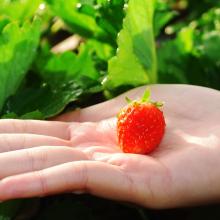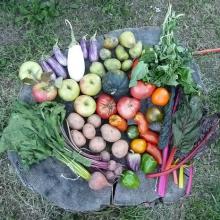Food
“WE WANT FARMERS to rediscover the sacredness of farming,” says Rev. Daniel Premkumar. Premkumar’s respect for farmers and farming grew from his experience of serving for nearly 40 years as a Lutheran parish priest in Andhra Pradesh, the “rice bowl” of India. “We have forgotten that the people who grow our food play a critical role in the care of creation,” he says. “That is why we are creating a farmers’ Bible.”
We sat in his office at the Synod of the Church of South India, the largest Protestant church in the country, in Chennai. The church includes 10,000 Protestant congregations (Presbyterian, Congregational, Reformed, Anglican, and Methodist) across South India. Rev. Premkumar is now director of diaconal concerns for the church, and he is advancing the concept of agri-ministry, which views agriculture as a form of ministry and upholds the need for church ministry to directly address the concerns of farmers. He created the Agricultural Workers Fellowship (AWF) in 2011. A small AWF workshop where theologians and farmers came together to discuss agricultural perspectives on biblical passages led to the idea of a book offering a reading of the Bible from the farmers’ perspective. They hope this book and a farm workers’ devotional guide will be finished by 2014.
The initiative to spur the church to explicitly integrate faith and agriculture comes at a time when food and farming in India—and globally—is at a critical juncture. Will India follow the United States in relying on genetically modified crops, monoculture, inorganic and unsustainable farming practices, and the corporatization of agriculture? Or will it restore farming as a livelihood, emphasizing safe food and healthy soil and water?
Something you should know about tall women who seem reserved and even distant — they may just be shy or socially awkward, and they may really want to be your friend. I've understood this all my life, of course, but I was well into adulthood when my mother told me she understood it too.
My mother was not the kind of woman who could chat easily with strangers or charm other people's children. She would not have survived as a social worker, therapist, or nurse. If she had belonged to a church that equated righteousness with personally comforting the deranged or the homeless or the dying, she would probably have changed denominations.
I tell you this only to point out that hospitality has many faces.
SOIL AND SACRAMENT is Fred Bahnson’s story of finding God through sustainable farming. A trained theologian, he learns to best live out his faith with shovel in hand, practicing a method of permanent agricultural design principles called “permaculture.”
We follow him through the liturgical year on an agrarian pilgrimage from one faith community to another, digging into the big question of how to best love his neighbor. His answers are uncovered through building relationships and healthier soil, communing with others and his Creator in the field. From jail cell to monastic cell, from a rooftop in Chiapas to his four-season greenhouse, Bahnson finds the intersection of community and solitude between the field rows. Just like the first Adam from the adamah (earth), we learn how to give more to the soil than we take away and to reverently observe the garden as fruitful and multiplying. “Human from humus”—he had me at hugelkultur. (Look it up—it’s really cool.)
Bahnson begins his pilgrimage in a Trappist monastery in South Carolina during Advent, joining the brothers in prayer and mushroom-growing practices, entering the dark cold winter silence of vigils and the soil. Bahnson then flashes back to 2001, to Holy Week in Chiapas with a Christian Peacemaker Team accompanying the Mayan Christian pacifist civic group Las Abejas—“The Bees.” In Chiapas we sit and eat with Bahnson on Maundy Thursday, corn tortillas and slow-cooked black beans made into holy elements, partaking of an “ancient and unnamed liturgy,” eating our way into mystery. Bahson ordains the creatures of the earth as perennial ministers of the soil, notes the transubstantiation of seed and potluck as Eucharist. He writes of beginning to think of growing food as the embodiment of loving his neighbors, the journey of the liturgical calendar through the mystery of soil. The book is a slow dance, a cosmic one-turn around the sun.
Q. What is one of the best ways to look good, feel good, and enjoy a long life?
A. Celebrate!
Yes, it's counterintuitive. Most Americans are convinced that if only we could eat little enough fat, ingest few enough calories, spend enough sweaty minutes at the gym, and drink exactly 5 ounces of red wine a day, then we might live forever — with enough expensive medical intervention, of course.
How dreary.
Some read Romans 13 and lean toward faith being a personal thing (pay your taxes and don’t break the laws, avoid sexual immorality, debauchery, jealousy, and instead clothe yourself with Christ), but the chapter also says God has established government as his “servant to do good.”
This is why, in a country where the public is encouraged to participate in government, I want to encourage people of faith to voice the heart of God when it comes to issues like feeding the least of these.
It's odd that Christians — people who claim to believe that God created the earth, sustains it day by day, and intends to create a new earth — are often so mixed up about sex and food. How long would the earth's inhabitants last without coupling and eating?
And yet most Christian writers right up to the 16th century praised celibacy, sexless marriages, and arduous fasting. Bless Martin Luther for loving his wife (and the beer she brewed), but lots of us still seem to think that good sex and good food — if not actually sinful — are at least pretty low on the religious values hierarchy.
Has it escaped our attention that, according to our most sacred literature, God made a naked male and a naked female, put them in the midst of grain fields and orchards, and told them to multiply?
If we're going to talk about food, we need to start with theology. Before chocolate was invented, a snake put "sinfully delicious" and "decadent" on the menu. Somebody fell for the marketing ploy, and we've had a complicated relationship with food ever since.
We've also had a complicated relationship with sex, and with siblings, and with weapons of mass destruction. It's all there in Genesis (where the WMDs are swords). And pretty soon, right-thinking people started coming up with rules to keep people from doing bad things. You can have sex with this person but not that one. You really shouldn't deceive, sell, or kill your brother. Beat your swords into plowshares.
The rules helped to restrain bad guys, and they gave would-be good guys some helpful pointers. Still, there were plenty of bad guys to go around, and good guys could get pretty anal about what other people should or shouldn't do. Anyway, it's obvious that you don't create a good marriage simply by avoiding sex with the wrong person, and you don't have a pleasant Thanksgiving dinner simply by not killing your siblings, and you don't banish war simply by wiping out as many weapons as possible. The rules are helpful — adultery, fratricide, and genocide are really bad ideas —but if you want a Peaceable Kingdom, you're going to need more than rules.
I am not shy about using the saltshaker, and neither I nor anyone else in my family has any sort of problem with blood pressure. That’s because we mostly don’t eat things that come out of packages or from fast-food places (where someone else takes them out of packages), and the salt that is a problem in the North American diet doesn’t come from the saltshaker but from the extreme levels of sodium in packaged foods.
But you will never hear Michelle Obama say that.
There was a similar unutterability to everything having to do with AIDS back in the day. Even when scientists had a fairly clear understanding of the nature of the threat and how it was spread, most “official” speech tended toward a hedging: “we don’t know what causes it; we don’t want to say what’s causing it …” Even today people don’t get tested because they don’t want to know, even though getting tested obviously doesn’t give you the virus — it merely points out that it is there. It seems to point to so much more, though.
Human beings seem to come with certain built-in spiritual inclinations, and gratitude is chief among them.
Parents and teachers think we have to be taught to say thank you, but maybe it just comes naturally. Gratitude is both accessible and enlivening.
Accessible because it’s as easy as paying attention to that which we might otherwise take for granted.
With gratitude, when our lover holds our hand for the umpteenth time it feels like it’s the first time and we’re grateful for them all over again. Or when we sit down to a plate of something humble and home-cooked it suddenly transports us to all those other meals in all those other places where we felt loved, accepted, and welcomed.
Pope Francis on Wednesday denounced consumerism and what he called the “culture of waste” of modern economies, especially when it comes to food.
“Throwing away food is like stealing from the table of those who are poor and hungry,” he said during his weekly audience in St. Peter’s Square.
His words came on the day the United Nations launched an anti-food waste campaign to mark World Environment Day.
Passion and purpose.
Sounds familiar, huh? Those two words are at the heart of activism and social justice. I could have safely assumed that almost every young Christian activist at the Justice Conference in Philadelphia back in February was passionate about a particular purposeful cause. I’m surprised a Christian conference hasn’t already picked up on the whole passion and purpose thing for slogan or tag line.
Christian conferences aside, I never thought those two words would be the foundation of a cutting-edge music and food festival at Merriwewather Post Pavilion, and certainly not one where 18,000 people were jamming to some of their favorite artists and scurrying over to local food trucks for healthy, delicious food in between sets. Heck, I didn’t know there was such a thing as a festival that focuses on both music and food.
By definition, an anesthetic is a drug used to relieve pain (analgesia), relax (sedate), induce sleepiness (hypnosis), spark forgetfulness (amnesia), or to make one unconscious for general anesthesia. Anesthetics are generally administered to induce or maintain a state of anesthesia and facilitate a procedure. I believe that anesthetic can be employed as a striking image for particular deficiencies in faith-based responses to extreme poverty.
As one can cite many examples where faith is proclaimed and practiced solely as an escape from – rather than engagement with – the numerous struggles associated with impoverishment, we recognize that anesthesia is incomplete without corresponding acts of sustainable social surgery.
...
A practical way to serve within the tension of anesthetic and advocate is to experience a small portion of life below the poverty line. The World Bank sets extreme poverty as below $1.50 per day, and I plan to stand in solidarity by attempting to eat on less than $1.50 per day over the course of five days (Monday – Friday).
If you eat food, here are two newish books you should know about.
You may already have met Robert H. Lustig, author of Fat Chance: Beating the Odds Against Sugar, Processed Food, Obesity, and Disease (2012). Lustig is the UCSF professor whose surprisingly riveting 90-minute lecture, "Sugar: The Bitter Truth," has already had nearly 3.5 million hits on YouTube. The thesis of his lecture: it's not dietary fat that's making Americans gain weight, it's sugar. And sugar is doing much worse things than increasing our clothing size. It's setting us up for a whole range of lethal diseases that are almost entirely avoidable.
...
In Salt Sugar Fat: How the Food Giants Hooked Us (2013), Moss, a Pulitzer Prize-winning investigative reporter, tells what the food industry has been up to during the last couple of decades. Food executives, Moss says, are nervous: people are figuring out that convenience foods aren't good for them.
For World Food Day, here’s a roundup of recent Sojourners magazine articles about food, a subject with tendrils throughout our lives and world—from field to farmworker to plate to body!
“Another world is not only possible, she is on her way. On a quiet day, I can hear her breathing.”
~ Arundhati Roy
Vegetables.
Who could have imagined an economy in which gentle vegetables were subversive?
But this is our world. A world where a vegetable, whose growth is imperceptible to the naked eye, can spider a crack into the concrete of our industrial food system.
We find ourselves in a food economy that sickens us. Health is divided along race and class lines: the food economy particularly sickens those whose wages do not allow them to buy the foods that can cure us of the diseases industrial “foods” cause.
Corporations, which do not speak the language of human love and health, wrangle to profit from the stream of ill Americans falling from the industrial foods conveyor belt. But we know that type 2 diabetes, heart disease, obesity, and some cancers are fully preventable by replacing part of what we eat with fruits and vegetables.
Why, in a wealthy, fertile country are we wrecking the environment to produce foods that kill us?
I’m not making friends among my family members with this challenge.
Because it was my idea to do this for a week (living on the equivalent budget of food stamps for seven days), everyone ends up coming to me to “check on the rules.” Basically, this means they ask me about ways they might work around the limitations of the challenge, and then get mad at me when I don’t give them a way out.
Yesterday ended up being a mixed bag. My wife, Amy, and I had to go to the other side of town for some errands, and it didn’t occur to either of us that we’d be gone over lunch time. Fortunately, one of the errands was at an Ikea, a giant housewares store that’s known for it’s affordable cafeteria-style meals, so we made it work. But even with their reduced-rate prices, we spent more than $9 for both of us and little Zoe to eat.
“Man,” I said, looking at my empty bowl, previously filled with pasta and Swedish meatballs, “that was way less than we usually spend going out, but it was still almost double what we have in the budget for one meal.”
THE FARM BILL has a profound impact on farming and nutrition. Three key things the multi-faceted bill provides are: a safety net for farmers, incentives for conservation practices, and food assistance for low-income families. Congress writes the farm bill every five to six years; the most recent Farm Bill, approved in 2008, expires Oct. 1.
At present, nearly 80 percent of the bill’s roughly $100 billion a year in spending goes to the food-assistance category, most notably to food stamps—the Supplemental Nutrition Assistance Program, which now helps feed 46 million people in the U.S. Less than 10 percent of current Farm Bill funding supports water and soil conservation practices, such as no-till farming and preserving wetlands and grasslands.
In the past, a significant part of the bill has been commodity payments made under various programs to farmers of crops such as corn, wheat, rice, cotton, and soybeans (but not fruits or vegetables). As farmers are currently benefiting from high grain prices, while the government faces budget deficits, the next Farm Bill seems poised to recognize that the time has come to end commodity payments.
However, farmers, challenged by volatile swings in crop prices and by uncertain weather, still need a safety net. In lieu of commodity payments, the Senate version of the Farm Bill, passed in late June, moves toward subsidizing crop insurance, which covers farmers—including fruit and vegetable growers—against both poor yields and poor prices.
I’m coming to terms with the realization that I’m a big, fat fake. But at least I’m in good company.
Amy’s birthday was last Sunday. We had just arrived in Portland, so we went to a fancy-pants restaurant, situated several hundred feet above the skyline, with a view of the entire surrounding city, the Willamette River and Mount Hood. We shared a bottle of wine, enjoyed outstanding service and indulged on gourmet food to celebrate her ever-growing tenure as an occupant of our planet.
The bill for the night was nearly enough to cover groceries for our family for up to two weeks.
We could manage it; we knew it was pricey before we got there. And it was fairly easy to justify too. We were making memories. It was an other step in the courtship, helping us fall in love with our new city. We had worked hard over the past eight years, establishing a church in Colorado, struggling to pay bills at times, and we’re now enjoying some material fruits of our labor.
What bullshit.
Seriously, how does anyone really justify spending that kind of money on one meal? After all, from our vantage point on the 30th floor, I could see scads of people below, standing on street corners, tucked in under sleeping bags and beneath cardboard boxes, walking wearily from one job to the next, hoping to pull together enough to make rent.

Image of the geodesic dome rooftop garden via http://www.conceptualdevices.com
According to our friends at Good.is, Buckminster Fuller'sgeodesic dome is making a comeback with urban farmers.
A new dome-based prototype promises an affordable method of rooftop aquaculture for apartment and commercial buildings—as the website calls it, getting "fish from the sky." The Globe / Hedron bamboo domewould house an aquaponics system—a mini-ecosystem in which plants clean the water where fish swim and fish waste fertilizes the plants—capable of feeding 16 people year-round. The unique structure of the dome, designed by Conceptual Devices, would support the weight of the fish tank, enabling installation on flat roofs without adapting the structure of the building. The design firm is partnering with Zurich-based group UrbanFarmers, which developed the aqauponic technology, and they're currently fundraising on indiegogo to get the project off the ground.
Over at Think Progress, Scott Keys reports on Rep. Allen West's latest comments:
"West, speaking at the Broward County Lincoln Day Dinner this past Saturday, warned the crowd about the danger of food stamps for American society. “In the last 10 years,” West said, the “food stamp program that has gone from about $20.6 billion to over $75 billion.” The Florida congressmen saw this increase not as a society practicing compassion for its most needy, but as a more nefarious plot. “That’s not how you empower the American people,” West declared. “That’s how you enslave the American people.”
Read the full article here















